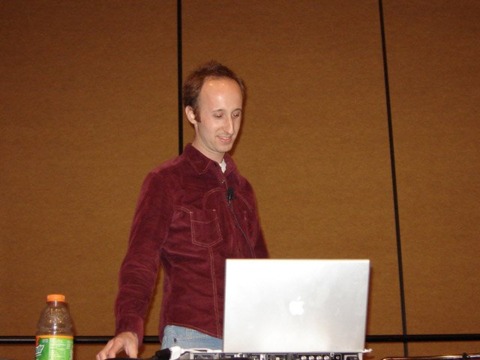GDC 07: Creating Spore
Chaim Gingold leverages his experience designing sim's creature, vehicle, building, and planet editors to instruct developers on how to reach the broadest audience possible.

SAN FRANCISCO--Two years ago, when Will Wright made his groundbreaking demonstration of Spore to a captive audience at GDC 2005, he tried to describe what sorts of gameplay mechanics he wanted to incorporate. True to himself, he described them largely by analogy to various toys and pop culture touchstones from his childhood: Etch-a-Sketch, Mr. Potato Head, Star Trek, Erector Sets, and Pac-Man, to name only a few.
Fast-forward two years to GDC 2007. Though returning attendees might have been disappointed at the lack of any additional gameplay footage, Spore design lead Chaim Gingold's session titled "Spore's Magic Crayons" nonetheless proved to be an entertaining presentation, elaborating on some of the toy analogies Wright had presented previously by describing in detail the design challenges of the creature, building, vehicle, and planet editors. The session reinforced the notion that Spore is fundamentally about a return to the basics of game design; a turning away from the question of "Will this sell?" to the questions of "What do people love to do?" and "How do we help them create?"
Gingold attributed his crayon analogy to the children's novel Harold and the Purple Crayon, wherein a child draws objects with a purple crayon that magically comes to life. With that simile in mind, Gingold explained over the next 45 minutes how Spore's ultimate goal was to create an editor with the same ease of use, capacity for fun, and transformational ability to make something real.
Gingold first identified several reasons that creativity is fun: disproportionate feedback (large outputs from small inputs--for example, a slot machine), self-exploration/identification, constructionism (people caring about what they've built themselves), and social pleasure (people loving to show off what they've built).
But Spore's design team quickly discovered that there were myriad challenges with an emergent editor that embraced open-ended creativity. It had to be easy and fun. It had to satisfy a broad range of fantasies and expectations. The output had to work in the animation system and with the game's rule sets. And how do you intuitively design a 3D object editor with a 2D interface for non-Maya-savvy players?
Most generally, how do you design an editor that your grandmother could use that still can yield countless creatures of varying size and shape that work with the gameplay?
The short answer is that constraints were applied to the editors that maximize the possibility of well-designed creatures while minimizing player confusion on how to build them. There was a conscious--and as Gingold describes it, necessary--choice to reduce the breadth of the editing tool.
The challenge still remained, though, in creating a design grammar within the editors that players could universally understand. The solution was in finding the essential representation of the object being built (for example, a vehicle) in terms of its essential and easily recognizable building blocks (for instance, the cockpit). By utilizing this language of creation, Gingold argued, they could more easily guide player expectations and thus have them more consistently produce nuanced and high-quality creatures, buildings, and vehicles.
Before concluding, Gingold moved on to an interesting philosophical observation, waxing oddly Marxist. In humanity's past, people did everything themselves, and life was communal (albeit tribal). At a certain point, societies began to form, and work became more specialized (butchers, blacksmiths, and so on). In today's corporate structure, this specialization seems to have spread out enormously: the programmer who writes the code for hair animation, or the accountant who does the books for a particular department. And despite close living conditions, we still maintain a strong sense of privacy.
The information age, however, has begun to combat that isolation, returning an element of community by letting us share our personal content with our fellow human beings around the world. Gingold implicitly argued that tools like Spore's editors are not only enablers of unique content creation, but also facilitators of social interaction.
"The computer can breathe life into the things that the players are making," said Gingold. "And that's one of our superpowers."
Got a news tip or want to contact us directly? Email news@gamespot.com
Join the conversation